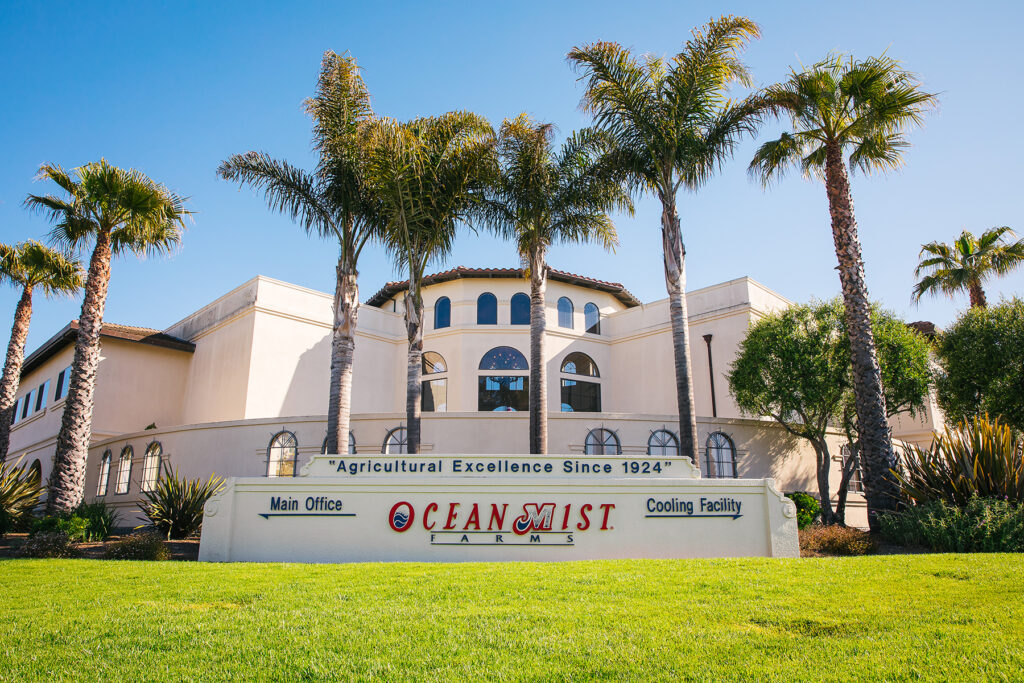Walking up and down the grocery store aisles, various shades of green start to blend beautifully together as you reach the fresh produce section. In the sea of green, your eyes gravitate toward a flower-shaped vegetable adorned with soft yet crunchy petals that gently protect an earthy-flavored heart: the artichoke.
According to the California Department of Food & Agriculture’s 2019-2020 Agricultural Statistics Review, the Golden State proudly grows 90 percent of the nation’s artichokes. Ocean Mist Farms produces a sizable majority of that jaw-dropping percentage.
Ocean Mist Farms (OMF) formed its roots nearly 100 years ago when Daniel Pieri and cousins Amerigo and Angelo Del Chiaros leased land south of Castroville, California, to launch an artichoke venture. Since then, the farm has grown into the largest grower of fresh artichokes in the United States and has added 30 other vegetables to its roster.
How has OMF accomplished being crowned the artichoke mogul of the United States? Through forward-thinking leadership, the ability to navigate through fads and trends and always being among the first to identify and implement cutting-edge technological solutions.
During his 21-year career at OMF, former President & CEO Joe Pezzini led many of the key initiatives that have propelled the farm to become a leader in agricultural technology. He provides seven candid observations on how producers can spur innovation and further advance technology in their farming operations.
1. Algorithms are Key to Improving Customer Satisfaction.
OMF uses a custom appointment loading system that is algorithm-based to calculate the ideal loading time. This algorithm uses real-time commodity-specific data from the operation’s harvest, receiving, cooling and sales disciplines to identify an ideal staging and loading time. This technology has enabled transparency and collaboration of data among disciplines within OMF’s supply chain operation, ultimately improving the farm’s overall ability to service its customers and supply the freshest product.
2. Blockchain Technology = Safer Food Safety Practices.
As an early adopter of blockchain, OMF has implemented this transaction-storing technology to provide end-to-end data of a product from the field to the store level. Leveraging the power of blockchain technology, along with the now industry-standard Product Traceability Initiative Label Technology, OMF uses data to further enhance its food safety efforts.
3. Consumer Trends Should Dictate Farm Innovation.
Shoppers’ needs and customer requests are two main factors that drive innovation at OMF. For example, to address the consumer trend for more convenience and personalization, OMF is working on a line of unique artichoke products (details to be revealed soon). The company also launched a store locator tool on its website to allow consumers to find specific Ocean Mist products based on their zip code.
4. Innovation Takes Time. Be Patient.
The process to develop a new artichoke variety takes a minimum of five years. OMF employs an intensive R&D program that analyzes and replicates hundreds of tissue cultures of desired varieties. The program relies on a meticulous selection process and analyzing extensive varietal data that makes reviewing several hundred varieties each year efficient, with the ultimate goal to develop a superior-eating artichoke. Most recently, it has introduced a new purple artichoke variety, called “Lila.”
5. Leverage Social Media to Become the Go-To Resource.
Through a robust content marketing strategy and clever use of existing social media technology, OMF has become the go-to resource for consumers for all things artichoke. The company creates how-to select infographics, how-to prepare videos and how-to eat GIFs—which are all shared on its website and social media platforms. These pieces of content provide consumers nutrition and preparation information about artichokes as well as offer incentives to put an Ocean Mist Farms artichoke in their shopping basket.
6. Look to Optical and Precision Spray Tech to Improve Production.
The marrying of optical and precision spray technologies has proven to be a “quantum leap” forward for production. OMF has utilized this technology tool to gain labor efficiencies and data intelligence leading to continuous improvement in field production.
7. The Future of Food Safety is Rapid Detection Tools and Predictive Models.
Technology has played and will continue to play a significant role in the enhancement of food safety practices.
“Technology has accelerated testing even beyond our ability to understand how a contamination is present. I think the future is using rapid detection tools to create a predictive model to detect a contamination before it becomes a foodborne illness issue. Diagnostic tools will produce data which can be analyzed to help prevent contamination events before they ever occur,” said Pezzini.
OMF’s keen ability to anticipate the next trend has allowed the farm to masterfully integrate cutting-edge technology to improve operations. In 2017, as part of the farm’s effort to increase its innovation aptitude, it signed on to be a sponsor of the Western Growers Center for Innovation & Technology (WGCIT)—a premier agtech incubator located in Salinas, California.
“We appreciate Western Growers Center for Innovation & Technology’s role as a think tank, bringing together the technology experts in the Silicon Valley and the agriculture experts of the Salinas Valley to develop and apply practical ag technology,” said Pezzini. “It has provided a forum for technology startups to connect and collaborate with farmers to refine technologies into something applicable to Salinas Valley agriculture production.”
OMF’s relationship with the WGCIT has resulted in numerous partnerships with agtech start-up companies residing in the tech incubator. In fact, OMF has recently piloted or engaged the applications of three WGCIT innovators: HeavyConnect, CropTrak and Zest Labs. Additionally, the farm has leveraged WGCIT’s expertise as a convener and collaborator for broader innovation to connect with other agtech partners including universities, global organizations and private investment firms.





